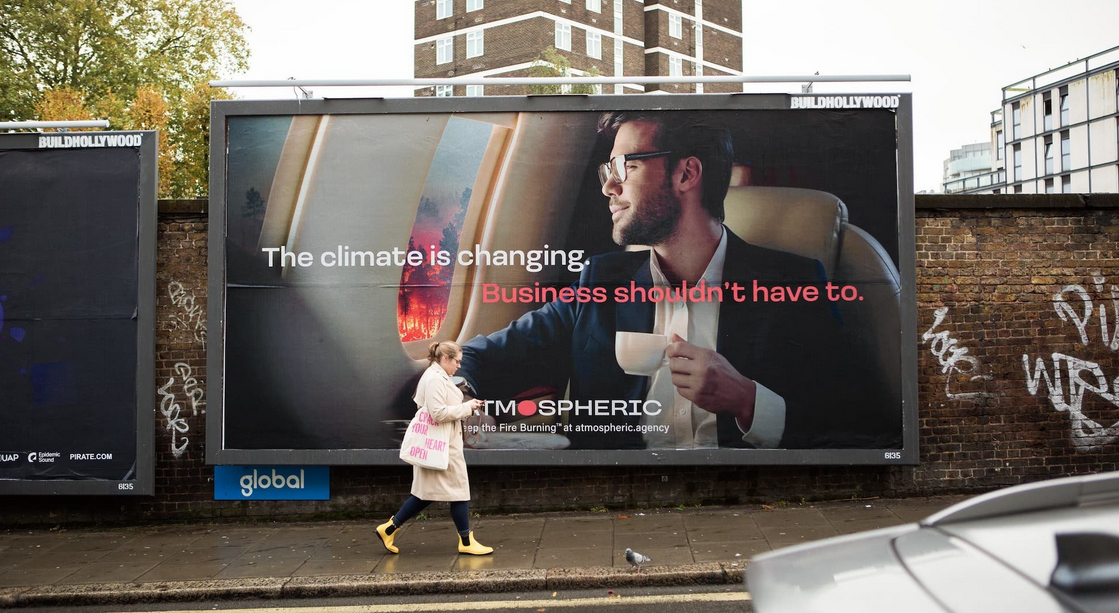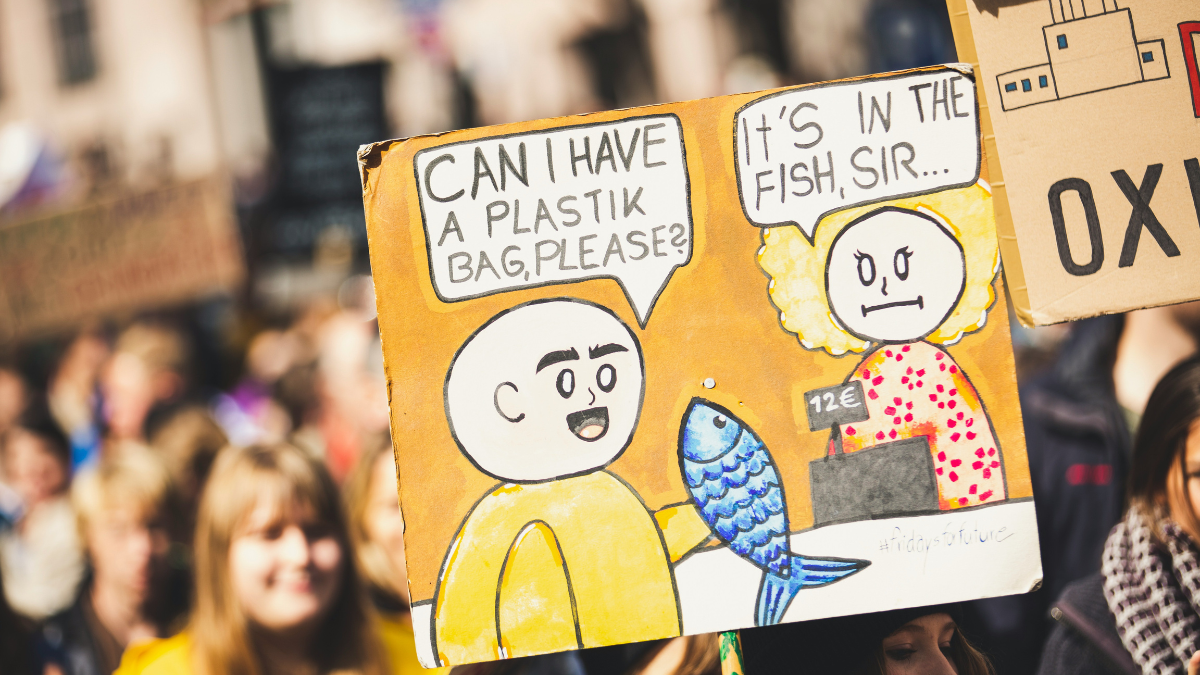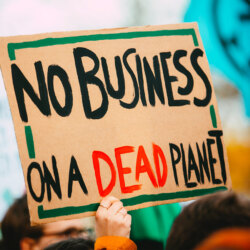The state of the climate is no laughing matter
Sea levels are rising faster than ever, the amount of CO2 in the atmosphere has risen by about 50% since the Industrial Revolution, and climate change is expected to cause approximately 250,000 additional deaths per year between 2030 and 2050. The stats are harrowing, but are they memorable enough to incite change? Cognitive psychologist Jerome Bruner suggests we are 22 times more likely to remember a fact when it has been wrapped in a story, and studies suggest we are more likely to remember a news story when it includes humour.
Here are a few ways that humour has helped communicate the sustainability message:
Satire
Using satire to raise awareness about environmental issues is becoming increasingly common, and for good reason: it gets attention. Late last year, Olivia Coleman made headlines for her role as Oblivia Coalmine — a villainous CEO of a fossil fuel company. The campaign for Make My Money Matter aimed to raise public awareness of the damaging links between the UK pensions industry and the climate emergency. Research from the campaign group, which was co-founded by film director Richard Curtis (Love Actually, About Time), found £88bn of UK pension savers’ money goes to fossil fuel companies, £20bn of which is to Shell alone.
The campaign used satire to portray oil and gas company leaders as evil, which felt relatable. In a sea of ads showcasing the planet’s doom and gloom, this one stood out for doing something different.
Elizabeth Preston from Undark highlighted this point: ‘Satire can capture people’s attention and make complex topics accessible to a wider audience. In some circumstances, it can even sway beliefs. If scientists want to communicate with the public about a serious subject, they might try a joke.’
This was backed up by a 2015 study that showed university students a video clip from The Daily Show or The Colbert Report about climate change or a control video on another topic. Jon Stewart from The Daily Show used jokes and sarcasm to address the subject, while Stephen Colbert spoke ironically. After seeing either satirical news clip, the students reported a greater certainty that global warming is happening.
Absurdity
In October last year, a new ad agency called Atmospheric came onto the scene, announcing it would be pitching for Saudi Aramco, the world’s largest fossil fuel company. ‘When the idea came up to do something that parodied an agency website, it sounded like too much fun not to do. Agency websites try so hard to be cool and meaningful – they’re an easy target,’ Oli Frost, co-creator of Atmospheric with Glimpse, told MediaCat Magazine.
The agency is deeply satirical. Their tagline is ‘Keep the Fire Burning.’ Hamill Shill, Old Guy Who Founded The Place, writes: ‘Profit, people, planet. In that order.’ The agency was created in response to the news that McCann was re-pitching for Aramco’s global media account. Frost, who uses satire and humour in most of his work, said the format worked best because of the absurdity.

‘The messages that advertising agencies put out about fossil fuel companies, compared to their actual actions, couldn’t be further removed. All we had to do is recreate it in a slightly more ‘honest’ form,’ he said.
They created a LinkedIn profile for Atmospheric’s CEO, Jamie Kolkot, who has made quite the impression on the ad industry, gaining 2,500 followers on LinkedIn and garnering over half a million impressions.
‘I’m slightly jealous of my alter-ego – he’s far more popular than me. He’s connecting with industry leaders in advertising and sustainability. He’s drawn the ire of a few fossil fuel dullards too,’ Frost revealed. The longer-term goal is we want the advertising and fossil fuel industries to part ways, like they did with tobacco. Once we’ve dispelled the myths that help agencies justify this work, it seems that’s inevitable.’
Brands that laugh (and wash) away guilt
Humour and satire can also help companies highlight their sustainability efforts. There is a proven disconnect between companies’ sustainability efforts and the way they communicate that to their customers. 88% of companies have a dedicated climate change page on their website, yet 52% of consumers have reported coming across greenwashing in brands’ sustainability claims. Despite companies’ best efforts to communicate their sustainability commitments, brands face a crisis of perceived greenwashing and socialwashing across all sectors.
Research by GfK revealed that in the technical goods category, 96% of consumers identified at least one of the top 10 brands as offering high-quality products, but ‘only 56% perceived at least one as being eco-friendly’. Leo Burnett London Chief Strategy Officer Josh Bullmore wrote that ‘brands are becoming like green wallpaper that fades into the background’. Those who use humour and satire to highlight their benefits will be the ones who stand out and remain memorable.
Take Apple’s Mother Nature sketch, in which CEO Tim Cook and VP Lisa Jackson bragged about the company’s environmental goals with Mother Nature, played by Octavia Spencer. The jury is still out on whether the skit was actually funny, and it received backlash ranging from ‘cringeworthy’ to claims of greenwashing, but it was effective, nonetheless.
Going one step further to create a tangible product, Better Climate Store launched a soap aptly named Greenwash that claims to ‘wash away the climate guilt with the only greenwash that actually helps the planet.’
Taking inspiration from deceitful sustainability statements made by corporations, the Greenwash bar soap promises to leave your skin refreshed and cleanse your soul, too.
Humour is not always the most effective option, as serious topics often call for serious advertising. But when appropriate, it can cut through competition and stand out in a sea of sameness — whether it’s a brand communicating its sustainability efforts or a fake agency highlighting the controversies in adland. As for Atmospheric, Frost says the best they could hope for is that McCann drops Saudi Aramco. ‘Someone else might take their place, but we’ll come for them too. With cupcakes.’
Featured image: Markus Spiske / Unsplash































